Saturday, January 17, 2009
Saint Anthony the Abbot
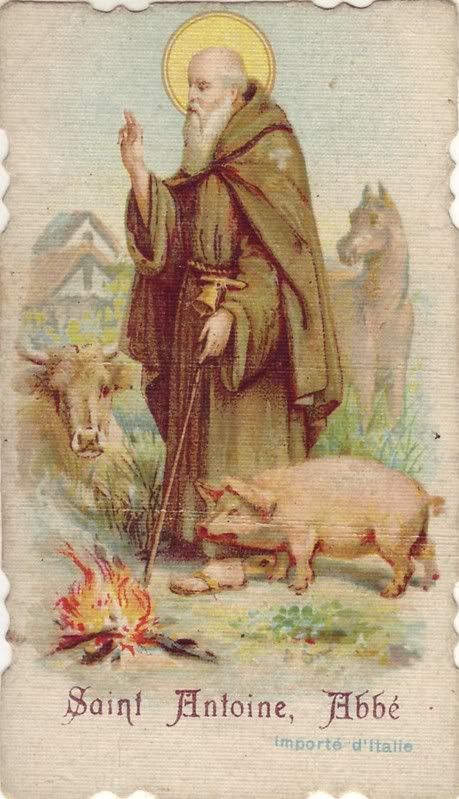
today is the feast of the father of all monks living in community.
See Catholic Tradition's page on him.
Saint Anthony the Abbot, please pray for us!
Labels: Our Saintly Brethern
Our Blessed Lady's Saturday
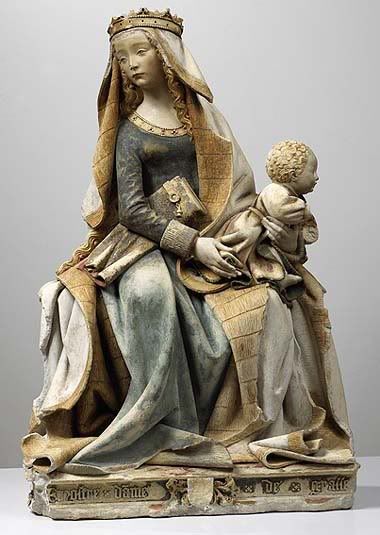
From The Imitation Of Mary
Holy and lovable name of Mary! Name that no one utters confidently without being the better for it! Happy the man who often recalls it with love, utters it devoutly, venerates it from the heart, and calls upon it often.
After the name of Jesus, that name that is above every other name [Phil 2, 9]. There is no other more worthy of respect, no other that is sweeter and dearer to the faithful than the name of Mary.
When the sinner invokes it, he feels a surge of hope in the Lord's mercy; the just man conceives a more ardent love; he who is tempted overcomes his own passions; he who is in tribulation feels consoled and inclined to be long-suffering.
After the name of Jesus, thy name, Mary, will be my comfort in affliction, my counsel in doubt, my strength in the struggle, and my guide at every step I take.
Labels: Our Blessed Lady
Friday, January 16, 2009
Friday At the Foot Of the Cross
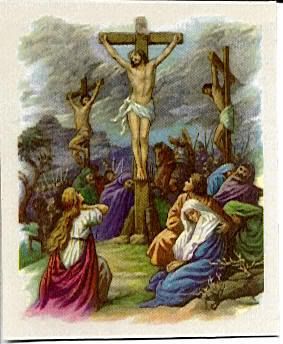
From The Incarnation, Birth, And Infancy Of Jesus Christ,
by St. Alphonsus Liguori
The Desire that Jesus Had to Suffer for Us
Baptismo habeo baptizari; et quomodo coarctor, usquedum perficiatur?
"I have a baptism wherewith I am to be baptized; and how am I straitened until it be accomplished?" ----Luke, xii. 50.
I.
Jesus could have saved us without suffering; but He chose rather to embrace a life of sorrow and contempt, deprived of every earthly consolation, and a death of bitterness and desolation, only to make us understand the love which He bore us, and the desire which He had that we should love Him. He passed His whole life in sighing for the hour of His death, which He desired to offer to God, to obtain for us eternal salvation. And it was this desire which made Him exclaim: I have a baptism wherewith I am to be baptized; and how am I straitened until it be accomplished? He desired to be baptized in His Own Blood, to wash out, not, indeed, His Own, but our sins. O infinite Love, how miserable is he who does not know Thee, and does not love Thee!
II.
This same desire caused Him to say, on the night before fore His death, With desire I have desired to eat this pasch with you. By which words He shows that His only desire during His whole life had been to see the time arrive for His Passion and death, in order to prove to man the immense love which He bore him. So much, therefore, O my Jesus, didst Thou desire our love, that to obtain it Thou didst not refuse to die. How could I, then, deny anything to a God Who, for love of me, has given His Blood and His life?
III.
St. Bonaventure says that it is a wonder to see a God suffering for the love of men; but that it is a still greater wonder that men should behold a God suffering so much for them, shivering with cold as an infant in a manger, living as a poor boy in a shop, dying as a criminal on a Cross, and yet not burn with love to this most loving God; but even go so far as to despise this love, for the sake of the miserable pleasures of this earth. But how is it possible that God should be so enamoured with men, and that men, who are so grateful to one another, should be so ungrateful to God?
Alas! my Jesus, I find myself also among the number of these ungrateful ones. Tell me, how couldst Thou suffer so much for me, knowing the injuries that I should commit against Thee? But since Thou hast borne with me, and even desirest my salvation, give me, I pray Thee, a great sorrow for my sins, a sorrow equal to my ingratitude. I hate and detest, above all things, my Lord, the displeasure which I have caused Thee. If, during my past life, I have despised Thy grace, now I value it above all the kingdoms of the earth. I love Thee with my whole soul, O God, worthy of infinite love, and I desire only to live in order to love Thee. Increase the flames of Thy love, and give me more and more love. Keep alive in my remembrance the love that Thou hast borne me, so that my heart may always burn with love for Thee, as Thy heart burns with love for me. O burning heart of Mary, inflame my poor heart with holy love.
Amen.
Labels: Friday At the Foot Of the Cross
Thursday, January 15, 2009
Not That I Didn't Already Know This
But my score of a perfect 40 on this quiz puts me right there with Ronaldus Magnus.
Tip of the silver-laced cocked hat to Mark at Irish Elk.
Tip of the silver-laced cocked hat to Mark at Irish Elk.
Labels: Any Serious Catholic Who Isn't A Very Conservative Republican...
Wednesday, January 14, 2009
Saint Hilary of Poitiers
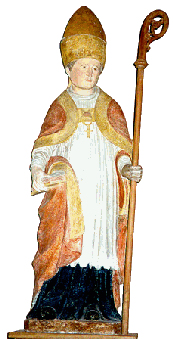
This is the feast of a bishop, confessor, and Doctor of the Church, who lends his name to the academic term beginning in January each year: Hilary Term.
Labels: Our Saintly Brethern
Tuesday, January 13, 2009
The Baptism Of the Lord And Octave Of Epiphany
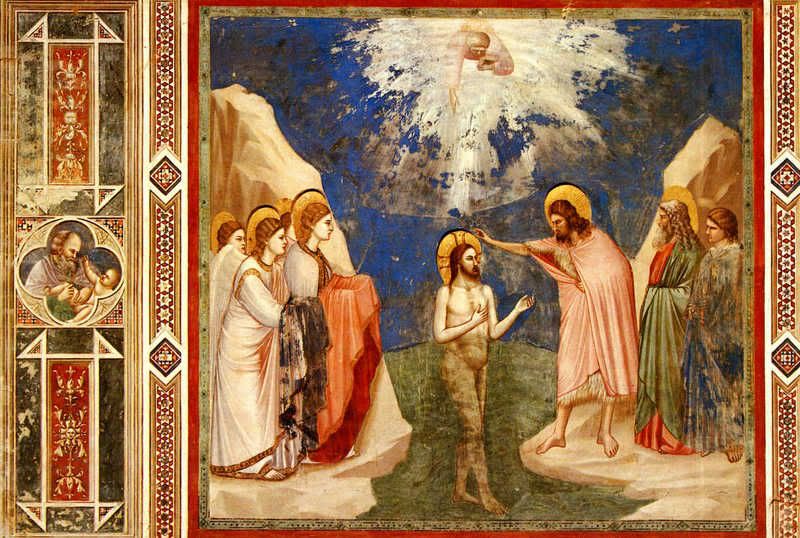
Lesson from the Second Nocturn of Matins for today from The Roman Breviary:
Joánnes baptízat, et accédit Jesus, sanctíficans quidem et ipsum, qui baptízat, præcípue tamen ut et véterem Adam sepéliat in aquis, et ante ómnia, ut per hæc sanctificéntur aquæ Jordánis: ut sicut erat spíritus et caro, ita et his, qui baptizándi erant, in spíritu et aqua sanctificatiónis succéssio traderétur. Non súscipit Baptísta, conténdit Jesus. Ego, inquit, opus hábeo a te baptizári. Lucérna dicit ad Solem, et vox lóquitur ad Verbum.
John is baptizing; Jesus draweth nigh. And he is come thither that perchance he may sanctify the one that now acteth as the ministrant of Baptism; and that he may beyond all doubt bury the Old Adam beneath the flood; and that he may hallow the baptismal streams, such as of Jordan, above all other water. For he who is both Spirit and Flesh would open, to all that should ever be baptized, the power of grace, whereby we may be born again, of the water and the Spirit. But lo! the Baptist putteth him off; nevertheless Jesus insisteth. I, saith John, have need to be baptized of thee! So speaketh the Candle to the Sun; so saith the Voice to the Word.
Labels: Our Lord
Monday, January 12, 2009
Plough Monday 2009
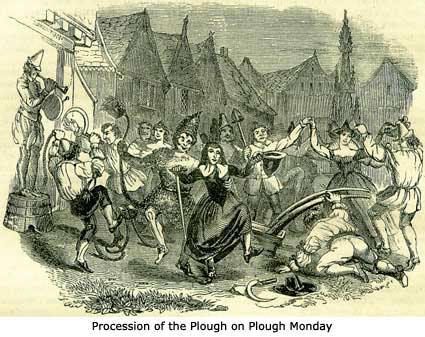
Another Plough Monday, and the end of Christmas festivity and vacation for another year. One is reminded of the line from W. H. Auden's Christmas Oratorio, that, though we are now in the merry season of carnival, there is vague awareness of the "whiff of apprehension at the thought of Lent and Good Friday."
Here is Auden in full:
Well, so that is that. Now we must dismantle the tree,
Putting the decorations back into their cardboard boxes --
Some have got broken -- and carrying them up to the attic.
The holly and the mistletoe must be taken down and burnt,
And the children got ready for school. There are enough
Left-overs to do, warmed-up, for the rest of the week --
Not that we have much appetite, having drunk such a lot,
Stayed up so late, attempted -- quite unsuccessfully --
To love all of our relatives, and in general
Grossly overestimated our powers. Once again
As in previous years we have seen the actual Vision and failed
To do more than entertain it as an agreeable
Possibility, once again we have sent Him away,
Begging though to remain His disobedient servant,
The promising child who cannot keep his word for long.
The Christmas Feast is already a fading memory,
And already the mind begins to be vaguely aware
Of an unpleasant whiff of apprehension at the thought
Of Lent and Good Friday which cannot, after all, now
Be very far off. But, for the time being, here we all are,
Back in the moderate Aristotelian city
Of darning and the Eight-Fifteen, where Euclid's geometry
And Newton's mechanics would account for our experience,
And the kitchen table exists because I scrub it.
It seems to have shrunk during the holidays. The streets
Are much narrower than we remembered; we had forgotten
The office was as depressing as this. To those who have seen
The Child, however dimly, however incredulously,
The Time Being is, in a sense, the most trying time of all.
For the innocent children who whispered so excitedly
Outside the locked door where they knew the presents to be
Grew up when it opened. Now, recollecting that moment
We can repress the joy, but the guilt remains conscious;
Remembering the stable where for once in our lives
Everything became a You and nothing was an It.
And craving the sensation but ignoring the cause,
We look round for something, no matter what, to inhibit
Our self-reflection, and the obvious thing for that purpose
Would be some great suffering. So, once we have met the Son,
We are tempted ever after to pray to the Father;
"Lead us into temptation and evil for our sake."
They will come, all right, don't worry; probably in a form
That we do not expect, and certainly with a force
More dreadful than we can imagine. In the meantime
There are bills to be paid, machines to keep in repair,
Irregular verbs to learn, the Time Being to redeem
From insignificance. The happy morning is over,
The night of agony still to come; the time is noon:
When the Spirit must practice his scales of rejoicing
Without even a hostile audience, and the Soul endure
A silence that is neither for nor against her faith
That God's Will will be done, That, in spite of her prayers,
God will cheat no one, not even the world of its triumph.
Labels: Christmas
Sunday, January 11, 2009
The Holy Family
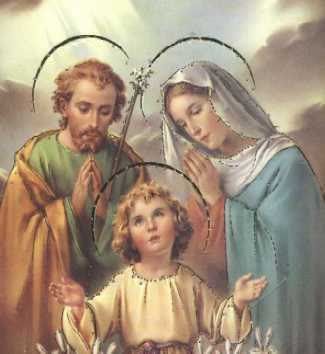
The World's Happiest Marriage
FROM THE WORLD'S FIRST LOVE
by Bishop Fulton J. Sheen
1952
It is very difficult for the unspiritual-minded to think of a golden mean between marriage and being alone. They think that a person is either tied up with someone in wedded life, or else that he lives in solitude. The two are not exclusive, for there is such a thing as a combination of marriage and solitude, and that is absolute virginity with wedded life, in which there is a union of the soul of one with another and yet an absolute separateness of body. Only the joys of the spirit are shared; never the pleasures of the flesh.
Today the vow of virginity is taken only outside of human espousals or marriage, but among some Jews and among some great Christian Saints, the vow of virginity was sometimes taken along with espousals. Marriage then became the frame into which the picture of virginity was placed. Marriage was like a sea on which the bark of carnal union never sailed, but one from which one fished the sustenance for life.
There are some marriages where there is no unity of the flesh, because the flesh has already been sated and dulled. Some partners abandon passion only because passion has abandoned them. But there are also marriages wherein, after a unity of the flesh, couples have mutually pledged to God a sacrifice of the thrill of unity in the flesh for the sake of the greater ecstasies of the spirit. Beyond both of these, there is a true marriage where the exercise of the right to another's body is annulled --- and even the desire of it; such is the marriage of two persons with the vow of virginity. It is one thing to give up the pleasures of married life because one is jaded with them, and quite another to give up the pleasures before they are ever experienced. Here the marriage is of the heart and not of the flesh; it is a marriage such as the stars have, whose light unites in the atmosphere although the stars themselves do not; a marriage like the flowers in the garden in springtime, who give forth perfume, although they themselves do not touch; a marriage like an orchestration, where a great melody is produced but where one instrument is without contact with the other. Such a marriage was actually the type of marriage which took place between the Blessed Mother and St. Joseph, one in which the right to another was surrendered for a higher purpose. The marriage bond does not necessarily imply carnal union. As St. Augustine says: "The basis of married love is the attachment of hearts."
First, then, we will inquire why there should have been a marriage at all, since both Mary and Joseph had taken the vow of virginity, and secondly, we will seek to understand the character of Joseph himself. The first reason for the espousal was that it kept the Blessed Mother covered with honor until the time came for her to reveal the Virgin Birth. We do not know exactly when she revealed the fact, but it is likely that it was done shortly after the Resurrection. There was no point in talking about the Virgin Birth until Our Lord had given the final proof of His Divinity. In any case, there were only a few who really knew it: the Mother herself, St. Joseph, Elizabeth, her cousin, and, of course, Our Blessed Lord. So far as public appearances went, it was thought that Our Blessed Lord was the son of Joseph. Thus the reputation of the Blessed Mother was conserved; if Mary had become a Mother without a spouse, it would have exposed the mystery of Christ's birth to ridicule, and would have become a scandal to the weak.
A second reason for the marriage was that Joseph could bear witness to the purity of Mary. This involved, both for Mary and for Joseph, the greatest sorrow this side of Calvary. Every privilege of grace has to be paid for, and so Mary and Joseph had to pay for theirs. Mary did not tell Joseph that she was conceived by the Spirit of Love, because the Angel did not bid her do so. The Blessed Mother once revealed to a Saint: "Outside of Golgotha, I never suffered such intense agony as in those days when, despite myself, I brought worry to Joseph, who was so just." The sorrow of Joseph came from the inexplicable. On the one hand, he knew that Mary had taken the vow of virginity, as he had done. It seemed impossible to believe her guilty, because of her goodness. But, on the other hand, because of her condition, how could he believe otherwise? Joseph suffered then what the mystics have called "the dark night of the soul." Mary had to pay for her honor, particularly at the end of her life, but Joseph had to pay for his at the beginning. Because Joseph had kept his vow, he was naturally surprised when he heard that Mary was with child. The surprise that Joseph felt was like that of Mary at the Annunciation: "How shall this be, seeing I know not man?" Mary wanted then to know how she could be both a virgin and a mother; Joseph wanted to know how he could be a virgin and a father.. It took an Angel to reassure them both that God had found a way. No human knowledge of science can explain such a thing. Only those who listen to Angels' voices can pierce that mystery. As Joseph had a mind to put Mary away secretly, the Gospel lifts the veil of the mystery to him: "But hardly had the thought come to his mind, when an Angel of the Lord appeared to him in a dream, and said, 'Joseph, son of David, do not be afraid to take thy wife Mary to thyself, for it is by the power of the Holy Ghost that she has conceived this child; and she will bear a son, whom thou shalt call Jesus, for He is to save His people from their sins.' " (Matt. 1:20, 21.)
Joseph's worries were overcome by a revelation of the dignity of Christ's Virgin Birth and of the nature of His mission --- namely, to save us from our sins. The very words of the Angel: "Do not be afraid to take thy wife Mary to thyself," seem to support the view that Joseph already believed that a miracle had taken place in Mary and that that was why he "feared" to bring her into his own house. It is unlikely that any man told of a Virgin Birth would ever have credited it if there had not already been in his heart a belief in the Messias, Christ, Who was to come. Joseph knew that the Messias would be born of the family of David, and he himself was of that family. He also knew of the prophecies concerning the Child, even the one of Isaias that He would be born of a Virgin. If Joseph had not already been described as a just man, the message of the Angel and the honor that was to come to Mary would have been enough to have inspired great purity in him. For if a modern father were told that one day his son would be President of the United States, it would inspire a changed attitude toward his wife, the mother of the child. In like manner, all anxiety and anguish now leave Joseph, as his soul is filled with reverence and awe for the love of Mary's secret.
That brings us to the second interesting question concerning Joseph. Was he old or young? Most of the statues and pictures which we see of Joseph today represent him as an old man with a gray beard, one who took Mary and her vow under his protection with somewhat the same detachment as a doctor would pick up a baby girl in a nursery. We have, of course, no historical evidence whatever concerning the age of Joseph. Some apocryphal accounts picture him as an old man; Fathers of the Church, after the fourth century, followed this legend rather rigidly. The painter, Guido Reni, did so when he pictured Joseph as an old man with white hair.
But when one searches for the reasons why Christian art should have pictured Joseph as aged, we discover that it was in order better to safeguard the virginity of Mary. Somehow, the assumption had crept in that senility was a better protector of virginity than adolescence. Art thus, unconsciously, made Joseph a spouse, chaste and pure by age, rather than by virtue. But this is like assuming that the best way to show that a man would never steal is to picture him without hands; it also forgets that old men can have unlawful desires, as well as young men. It was the old men in the garden who tempted Susanna. But more than that, to make Joseph out as old portrays for us a man who had little vital energy left, rather than one who, having it, kept it in chains for God's sake and for His holy purposes. To make Joseph appear pure only because his flesh had aged is like glorifying a mountain stream that has dried. The Church will not ordain a man to his priesthood who has not his vital powers. She wants men who have something to tame, rather than those who are tame because they have no energy to be wild. It should be no different with God.
Furthermore, it is reasonable to believe that Our Lord would prefer, for a foster father, someone who had made a sacrifice rather than someone who was forced to it. There is the added historical fact that the Jews frowned on a disproportionate marriage between what Shakespeare calls "crabbed age and youth"; the Talmud admits a disproportionate marriage only for widows or widowers. Finally, it seems hardly possible that God would have attached a young mother, probably about sixteen or seventeen years of age, to an old man. If He did not disdain to give His Mother to a young man, John, at the foot of the Cross, then why should He have given her an old man at the crib? A woman's love always determines the way a man loves: she is the silent educator of his virile powers. Since Mary is what might be called a "virginizer" of young men as well as women, and the greatest inspiration of Christian purity, should she not logically have begun by inspiring and virginizing the first youth whom she had probably ever met --- Joseph, the Just? It was not by diminishing his power to love, but by elevating it, that she would have her first conquest, and in her own spouse, the man who was a man, and not a mere senile watchman!
Joseph was probably a young man, strong, virile, athletic, handsome, chaste, and disciplined; the kind of man one sees sometimes shepherding sheep, or piloting a plane, or working at a carpenter's bench. Instead of being a man incapable of loving, he must have been on fire with love. Just as we would give very little credit to the Blessed Mother if she had taken her vow of virginity after having been an old maid for fifty years, so neither could we give much credit to a Joseph who became her spouse because he was advanced in years. Young girls in those days, like Mary, took vows to love God uniquely, and so did young men, of whom Joseph was one so pre-eminent as to be called the "just." Instead, then, of being dried fruit to be served on the table of the King, he was rather a blossom filled with promise and power. He was not in the evening of life, but in its morning, bubbling over with energy, strength, and controlled passion.
Mary and Joseph brought to their espousals not only their vows of virginity, but also two hearts with greater torrents of love than had ever before coursed through human breasts. No husband and wife ever loved one another so much as Joseph and Mary. Their marriage was not like that of others, because the right to the body was surrendered; in normal marriages, unity in the flesh is the symbol of its consummation, and the ecstasy which accompanies a consummation is only a foretaste of the joy that comes to the soul when it attains union with God through grace. If there is satiety and fed-up-ness in marriage, it is because it falls short of what it was meant to reveal, or because the inner Divine Mystery was not seen in the act. But in the case of Mary and Joseph, there was no need of the symbol of the unity of flesh, since they already possessed the Divinity. Why pursue the shadow when they had the substance? Mary and Joseph needed no consummation in the flesh for, in the beautiful language of Leo XIII: "The consummation of their love was in Jesus." Why bother with the flickering candles of the flesh, when the Light of the World is their love? Truly He is Jesu, voluptas cordium. When He is the sweet voluptuousness of hearts, there is not even a thought of the flesh. As husband and wife standing over the cradle of their newborn life forget, for the moment, the need of one another, so Mary and Joseph, in their possession of God in their family, hardly knew that they had bodies. Love usually makes husband and wife one; in the case of Mary and Joseph, it was not their combined loves but Jesus Who made them one. No deeper love ever beat under the roof of the world since the beginning, nor will it ever beat, even unto the end. They did not go to God through love of one another; rather, because they went first to God, they had a deep and pure love one for another. To those who ridicule such holiness, Chesterton wrote:
That Christ from this creative purity
Came forth your sterile appetites to scorn.
Lo! in her house Life without Lust was born
So in your house Lust without Life shall die.
In a flesh-marriage, the body first leads the soul, and then, later, comes a more reposed state, when the soul leads the body. At this point, both partners go to God. But in a spirit-marriage, it is God Who possesses both body and soul from the beginning. Neither has a right to the other's body, for that belongs to the Creator through the vow. Mary and Joseph thus combined solitude and espousal through the spiritual magic of virginity along with togetherness. Joseph renounced paternity of the flesh, and yet found it in the spirit, as the foster father of Our Lord; Mary renounced maternity, and yet found it in her virginity, as the closed garden through which no one should pass except the Light of the World Who would break nothing in His coming --- any more than light breaks the window by coming into the room.
How much more beautiful Mary and Joseph become when we see in their lives what might be called the first Divine Romance! No human heart is moved by the love of the old for the young; but who is not moved by the love of the young for the young, when their bond is the Ancient of Days, Who is God? In both Mary and Joseph, there was youth, beauty, and promise. God loves cascading cataracts and bellowing waterfalls, but He loves them better, not when they overflow and drown His flowers, but when they are harnessed and bridled to light a city and to slake the thirst of a child. In Joseph and Mary, we do not find one controlled waterfall and one dried-up lake, but rather two youths who, before they knew the beauty of the one and the handsome strength of the other, willed to surrender these things for Jesus.
Leaning over the manger crib of the Infant Jesus, then, are not age and youth, but youth and youth, the consecration of beauty in a maid and the surrender of strong comeliness in a man. If the Ancient of Days turned back eternity and became young again; if the condition of entering Heaven is to be reborn and to become young again, then, to all young married couples: here is your model, your prototype, your Divine Imaginal. From these two spouses, who loved as no couple on earth has ever loved, learn that it takes not two to love, but three: you and you and Jesus. Do you not speak of "Our love" as something distinct from the love of each one of you? That love, outside of both of you, and which is more than the addition of your two loves, is the love of God.
Married couples ought to say the Rosary together each night, for their common prayer is more than the separate prayers of each. When the child comes, they should say it before the Crib, as Joseph and Mary prayed there. In this earthly Trinity of Child, Mother, and foster father, there were not two hearts with but a single thought, but one great Heart into which the other two poured themselves out as confluent streams. As trustees of carnal wealth, husband and wife will see that the flames of love have been given to them not to scorch the flesh, but to solder life. And children will ask, If He Who is the Son of God made Himself subject to His parents in reparation for the sins of pride, then how shall they escape the sweet necessity of obeying their parents who stand in the place of God? Democracy put man on a pedestal; feminism put woman on a pedestal. But neither democracy nor feminism could live a generation out unless a Child was put onto a pedestal. This is the significance of the marrying of Joseph and Mary.
Labels: The Holy Family






































































































